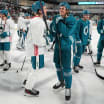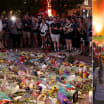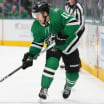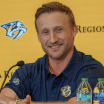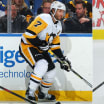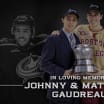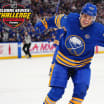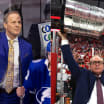Henderson remains hero in Canada 50 years after 1972 Summit Series goal
Forward says iconic winner in Game 8 against Soviet Union 'changed a lot of lives'
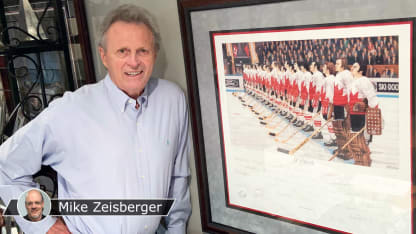
On one wall is a framed portrait containing personally signed hockey cards of every one of his teammates from the famed 1972 Summit Series, an eight-game showdown between Canada-born NHL players and the Soviet Union.
Not too far away is a painting of he and his teammates standing on the blue line listening to the national anthem during the series. The portrait is, fittingly, titled "O Canada."
The coup de grace is one of the most famous photos in Canada, even now. It shows him bear-hugging teammate Yvon Cournoyer while celebrating Henderson's goal with 34 seconds remaining in Game 8 that gave Canada a 6-5 victory, and a 4-3-1 win in the series, at Luzhniki Palace of Sports in Moscow on Sept. 28, 1972.
It is the moment that made him a national hero to this day.
"I guess that's the way people still look at me," the 79-year-old said. "It changed my life. It changed a lot of lives. It changed hockey. And it brought the country together. I mean, I still get stopped on the street, at the airport, at the store and get asked about it.
"I've been fighting cancer for over a decade and I'm fortunate that I'm feeling pretty good right now. It makes you appreciate things, embrace things."
Including what he calls The Goal.
"I'm fortunate," he said. "I turn 80 next year and still weigh the same as when I played (about 180 pounds). I play golf twice a week. And I work out almost every day."
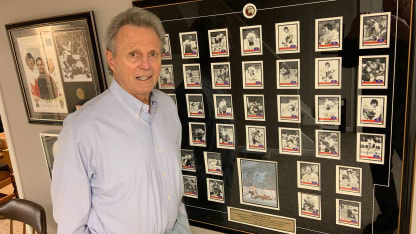
Henderson's weight room is in the basement. Each morning he goes down to pump iron, he sees the photos and paintings of The Goal.
"Some days are better than others," he said. "But seeing them can put a bit of a smile on your face."
He's not alone. Half a century after The Goal, his feel-good story is still having that same effect on people across the country.
With good reason. Wednesday marks the 50th anniversary of Henderson's goal, and it is being celebrated nationwide.
Three books about the series, including one written by Ken Dryden, a goalie for Canada in '72, have been released recently. A four-part documentary on the event will culminate with the finale shown on CBC in Canada on Wednesday to mark the anniversary. By his own estimation, he's done "dozens and dozens" of interviews the past few months.
Last week a group of players including Henderson, Cournoyer, Serge Savard, Ken Dryden, Ron Ellis, Dennis Hull, Frank Mahovlich, Peter Mahovlich, Rod Seiling, Don Awrey and sons representing Vic Hadfield and the late Bill White, were honored in the Parliament of Canada in Ottawa. They received a two-minute standing ovation from elected officials when they entered the chamber. Minutes later, Henderson was the subject of another one when Prime Minister Justin Trudeau mentioned his name while recalling The Goal.
"You could hear the cheers from coast to coast to coast," Trudeau said. "Everyone remembers where they were. Except me. I was only 9 months old."
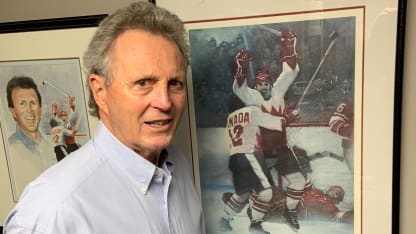
Trudeau's dad, Pierre, was prime minister at the time and helped negotiate the framework of the series with the Soviet government. After Henderson's heroics, Pierre Trudeau greeted the players one by one when they landed in Montreal.
"They weren't only heroes because they won the series," Justin Trudeau said. "They were all heroes because they taught us a lesson. They showed us how grit and hard work pays off. They showed us when there's only 34 seconds left to play, you never give up."
Justin Trudeau recalled one of Henderson's stories, about when the forward received a call from a friend during the collapse of the Berlin Wall in 1989. Henderson's buddy joked that after his goal in 1972, "the Soviets never recovered."
"I will let the experts debate on whether there was any truth to that," the prime minister said with a chuckle. "But what is absolutely true is that the Summit Series was a defining moment in our country."
Henderson agrees.
"I had a chance to talk to the prime minister later and he told me how his dad always said how the series brought Canada together," Henderson said. "I mean, we didn't know anything about the Soviets, not just about the players but the people who lived there. Remember, the Cold War was still going on. It had the attention of our entire country. For that last game, people in Canada got off work and classes were canceled."
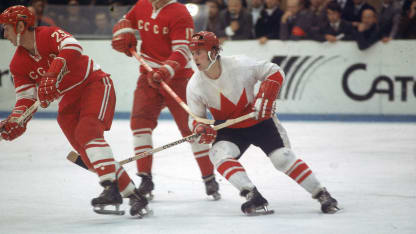
© Getty Images
To Henderson's point: Tom Wells, Ontario Education Minister at the time, ordered that every available TV set in provincial schools be tuned in to Game 8.
"We were going to put them in their place," Henderson said. "But when they surprised us and beat us 7-3 in the first game, it became a battle between our way of life and theirs.
"We hated them. But we shouldn't have hated them. We should have hated their political system. Over the years I've realized that after I got to know and became friends with some of their players. It was about their system, not them."
\\\\
When Sidney Crosby scored the overtime goal that gave Canada a 3-2 victory against the United States for the gold medal at the Vancouver Olympics on Feb. 28, 2010, it ignited a debate in Canada: Which was the most iconic goal?
A lot of fans at the time weren't even alive for the Summit Series, with Crosby's Golden Goal coming almost four decades after Henderson's moment. Crosby himself wouldn't be born until almost 15 years later. For the younger generation, his moment was fresher and easier to relate to.
Not for Crosby, however.
"He scored the biggest goal ever in hockey," the Pittsburgh Penguins center said of Henderson. "What he did, at a time where no one really knew much about the Soviets, it was so monumental. It was so historical."
So much so that in 2010, Canadian businessman Mitchell Goldhar bought Henderson's Game 8 sweater for more than $1 million at auction.
Henderson, a noted public speaker, and his wife, Eleanor, were addressing about 300 couples at a marriage conference in Victoria, British Columbia, when Crosby scored. They'd watched the third period, but overtime conflicted with one of their speaking sessions. So Henderson asked the crowd to speak up if they heard on the radio that someone scored.
And when informed that Crosby had done just that, Henderson led the room in the singing of "O Canada."
"How cool is that to have Paul Henderson do that?" Crosby said. "I mean, it's Paul Henderson. He scored the goal."
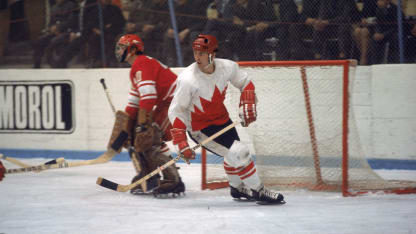
© Getty Images
In reality, Henderson's iconic goal would have been meaningless had he not scored the winners in Games 6 and 7.
Canada trailed the series 1-2-1 when it shifted overseas to Moscow. Henderson scored twice in a 5-4 loss in Game 5 and sustained a concussion.
"The doctors told me that I was done and to take my equipment off," Henderson said. "I told them no way. (Coach) Harry Sinden said he wouldn't stop me if I was set on playing."
The loss meant Canada trailed the series 1-3-1 and needed to sweep the final three games to come out ahead.
"I remember telling my wife, 'If we don't win the last three, we're going to be known as the biggest losers in the history of Canadian hockey,'" Henderson said. "Now we're probably the team of the century."
Henderson did his part to make that happen, scoring the deciding goals in a 3-2 win in Game 6 and 4-3 victory in Game 7.
With the score tied 5-5 and a minute remaining in Game 8, Henderson was told that he, Bob Clarke and Ron Ellis would be the next line up. He began yelling for Peter Mahovlich to get off the ice and jumped on when he got to the bench.
"I never heard him," Mahovlich said. "I was coming off because I was tired."
Henderson made a beeline for the Soviet net but wiped out after taking a wild stab at the puck. He got up and headed for the crease in front of goalie Vladislav Tretiak.
Phil Esposito directed the puck at the Soviet net, leading to a wild scramble. With Tretiak down, Henderson got the rebound and told himself to keep it low.
He did. And with that, a hero was born.
Cue the famous five words of Hall of Fame broadcaster Foster Hewitt that resonate to this day:
"Henderson has scored for Canada."
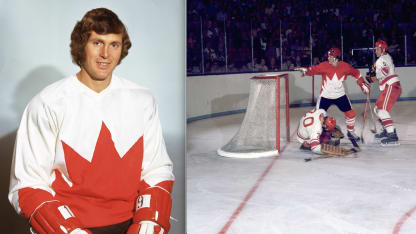
For his part, Henderson's first thoughts when the puck slid across the line had nothing to do with fame. Or with the celebration he'd sparked back home.
"My initial reaction was to say out loud, 'Dad would have loved this one,'" Henderson said. "My dad, Garnet, passed in 1968 and he really wanted me to be a hockey player.
"A nanosecond later, I was in Cournoyer's arms and the celebration was on."
More than four decades later, Henderson was in Europe for his induction into the International Ice Hockey Hall of Fame, part of the Class of 2013. He was caught completely off guard when his presenter ended up being Tretiak.
"He pointed his finger at me and said, 'I've watched tape of that goal over and over, and you know why you scored it?'"
Henderson said Tretiak paused for about five seconds before delivering the answer.
"He said, 'I'll tell you why you scored it. Bad, bad goaltending.'
"I still chuckle at that line to this day."
\\\\
In honor of the anniversary, the Hockey Hall of Fame in Toronto has been displaying Henderson's Game 8 stick as part of a 1972 Canada team exhibit since Sept. 9. He has not been inducted himself, however, which strikes some greats as wrong.
"First of all, we'll never replace '72," Wayne Gretzky told The Athletic in 2020. "And while we're talking about it, it's absolutely asinine to me that Paul Henderson's not in the Hockey Hall of Fame.
"The most incredible thing we've ever had for our country."
An endorsement from Gretzky, the NHL's all-time leading scorer with 2,857 points (894 goals, 1,963 assists) is flattering, of course. But Henderson, who in 2013 was awarded the Order of Canada for "outstanding achievement, dedication to the community and service to the nation," likes things the way they are.
"I don't want to go in," he said with a laugh. "If I went in there, there wouldn't be this debate and people would forget about me."
Hardly.
To be fair, his NHL statistics aren't heady enough to get him in. He had 477 points (236 goals, 241 assists) in 707 games with the Detroit Red Wings, Toronto Maple Leafs and Atlanta Flames from 1963-1980.
It's his Summit Series heroics that make for the debate.
"I don't worry about it," he said. "I mean, one of the worst things a person can have is a big head. My initials are PGH (Paul Garnet Henderson) and for me, that stands for patience, gentleness and humility. That's what's important."
So is staying healthy.
Ten days before Crosby scored his Golden Goal, Henderson announced on national television that he had leukemia, which had been diagnosed three months earlier. In 2012 he entered a clinical cancer trial in Bethesda, Maryland, that he said saved his life. He said a drug he's been receiving recently from a Hamilton medical facility has prolonged that.
"Look, I know I can die at any time and I'm not afraid of that," Henderson said. "I just try to live every day to the fullest. I don't want to be a day younger or day older. I'm happy where I am."
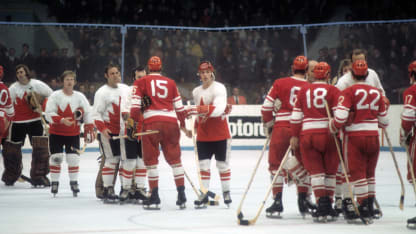
© Getty Images
That will be the case Wednesday when a grateful Henderson is scheduled to join a number of teammates at Scotiabank Arena in Toronto for a ceremony honoring the 1972 Canada team prior to a preseason game between the Maple Leafs and Montreal Canadiens.
"It's a privilege," he said. "Ten members of the team have passed away, which is sad, but It's encouraging the way we've been embraced by the country, by the government, by the fans.
"Our accomplishment is something I'm proud of. We're proud of. I love this country. We all do."





